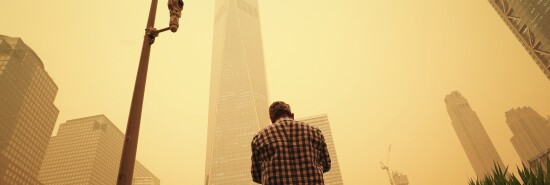
Debunking the climate change narrative on the Canadian wildfires
Danielle Butcher Franz
Video Embed
As New York sits in an eerie red haze thanks to wildfires in Canada, air quality has plummeted as smoke and emissions are pumped into the air. Local news has urged masks outside, limited time outdoors, and checking in on vulnerable neighbors with preexisting breathing conditions. Amid this spectacle, the East Coast finds itself thrust into a discourse mirroring the challenges long faced by the West: wildfires and their intricate relationship with climate change.
Climate activists have been quick to attribute the wildfires and their smoke to escalating global temperatures. House Progressive Caucus Chairwoman Pramila Jayapal (D-WA) took to Twitter to blast “climate deniers” in Congress, while the Sunrise Movement attributed the situation to the use of fossil fuels. Yet conservationists and foresters have pushed back, emphasizing that inadequate forest management shoulders the blame for these infernos. After all, unchecked brush and overgrowth make it exceedingly difficult to contain fires, leading to extensive damage in their wake.
REPUBLICAN PRIMARY: BIG TENT OR BIG TOP?
There is validity to both perspectives, though it is a misrepresentation to credit climate change for New York’s hazy skyline. Recognizing this is crucial if we are to make informed decisions regarding effective forest management and climate policy.
The effects of climate change, including drier conditions, undeniably contribute to the heightened danger and severity of recent fires, but climate change itself does not cause forests to ignite spontaneously. In fact, forest fires are a natural phenomenon and can be beneficial to ecosystems when they burn and extinguish naturally — as opposed to being sparked by careless campers and other human activities. However, the severity of the fires we witness today is greatly influenced by poor forest management practices. Allowing forests to grow without proper maintenance has resulted in excessive overgrowth, creating a volatile environment primed for ignition.
To address this complex problem, we must strike a balance between mitigating the effects of climate change and implementing responsible forest management strategies. Controlled burns, clearing underbrush, and reducing tree crowding are all ways to prevent forests from becoming unchecked bonfires. We must accept that managing our forests isn’t harming ecosystems but instead giving them a helping hand to thrive.
Fortunately, members of Congress from both sides of the political aisle have united to propose legislation that would reduce the regulatory barriers to active forest management. For instance, the Save Our Sequoias Act would promote active management of California’s sequoia groves. Contrary to what critics may say, this legislation would not loosen environmental protections but better allow humans and nature to work together for the best outcomes.
While natural disasters provide an easy opportunity to point fingers and place blame, our time is better spent pointing toward solutions. Wildfires demand a departure from our usual rhetoric and echo chambers, urging us to explore approaches that consider the complexities at hand. Luckily, the path forward is not about proving either side wrong. Instead, it lies in embracing the shared goal of finding practical, commonsense solutions. Through collaboration, informed decision-making, and a commitment to proactive measures, we can protect our communities, safeguard our environment, and ensure a sustainable future for generations to come.
CLICK HERE TO READ MORE FROM THE WASHINGTON EXAMINER
Danielle Butcher Franz (@DaniSButcher.) is the executive vice president of the American Conservation Coalition Action.
